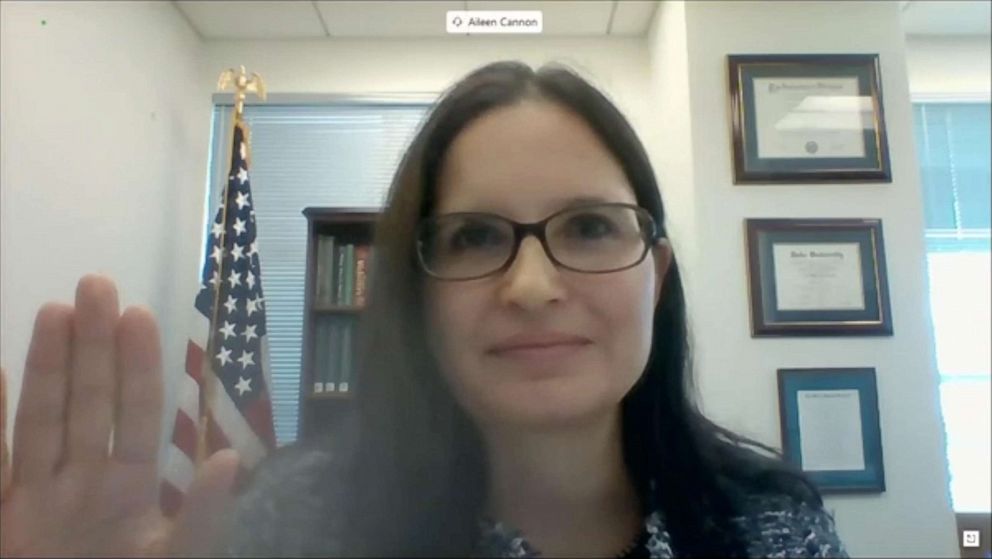Politics
JUST IN: Judge Cannon Moves To Unseal Damning Records In Trump’s Documents Case

Another major trove of documents in former President Donald Trump’s Mar-a-Lago case is about to be made public.
On Sunday Florida U.S. District Judge Aileen Cannon ordered the release of several pretrial motions submitted by Trump’s attorneys, including a motion to dismiss filed in February that accused special counsel Jack Smith of “selective and vindictive prosecution.” The disclosure would open a new window into how the Republican’s defense team plans to lay out their claim that many of the steps taken by Smith, the FBI, and the National Archives to gain possession of classified documents violated Trump’s civil liberties.
The development was first noticed by investigative reporter Julie Kelly, who has previously noted several recent occasions where Judge Cannon ordered the unsealing of documents in the case.
Judge Cannon's unsealing crusade is about to get even more interesting.
She just issued an order authorizing the release of motions currently under seal including Trump's motion to dismiss for selective/vindictive prosecution.
I will be on docket watch and post when available! pic.twitter.com/QAIMK66gqA
— Julie Kelly 🇺🇸 (@julie_kelly2) April 28, 2024
Trump’s attorneys also cite Smith’s attempts to withhold the “15 boxes” of classified documents containing national secrets.
In November, Judge Cannon scolded the Biden prosecutor for pushing a “broad and unconvincing theory” about why Trump should not have access to the evidence against him. Key to his argument will be making the case that Trump put national security at risk by retaining documents from his time in the White House.
Trump’s attorneys have also made hay over how Smith has allegedly attempted to bias a grand jury.
Former Trump attorney Timothy Parlatore, speaking about his time before a grand jury, said he witnessed firsthand the lengths that DOJ prosecutors would go to intimate the president is guilty by exercising his Fifth Amendment and attorney-client privileges:
“I went before the grand jury myself… I was really stunned by what I saw in the grand jury room and the conduct of the prosecutors. They made many attempts to try to get at privileged communications. They would ask me about conversations with my client. They would make improper references to the jury, trying to mislead them about that,” Parlatore said.
Twice last week, the Trump-appointed federal judge ordered the unsealing of records that Smith sought to keep secret. One batch detailed a conversation that allegedly took place between defense attorney for a Trump codefendant and Justice Department prosecutor Jay Bratt. According to the defense, Bratt threatened to sabotage a judicial nomination for attorney Stanley Woodward if he didn’t withdraw from representing Walt Nauta.
“Upon Mr. Woodward’s arrival at Main Justice, he was led to a conference room where Mr. Bratt awaited with what appeared to be a folder containing information about Mr. Woodward,” the document reads. “Mr. Bratt thereupon told Mr. Woodward he didn’t consider him to be a ‘Trump lawyer,’ and he further said that he was aware that Mr. Woodward had been recommended to President Biden for an appointment to the Superior Court of the District of Columbia.”
“Mr. Bratt followed up with words to the effect of ‘I wouldn’t want to do anything to mess that up,” it goes on.
That same week, Judge Cannon ordered a second disclosure that appears to show what Kelly called a “criminal” conspiracy between DOJ and the National Archives.
In late September 2021, just as a referral to the DOJ was imminent, Deputy White House Counsel Jonathan Su asked one of President Trump’s coordinators for the probe to authorize a colleague to access notes taken in the final days of the Trump administration as staffers prepared the storage of classified materials. According to the unredacted document, Su intervened when Gary Stern, general counsel for the National Archives, attempted to provide a copy of the notes to Trump’s representative.
“[C]ould we discuss the process before anything is provided to him?” Su wrote to Stern, who agreed but said the request was “atypical” of most records-gathering efforts.

